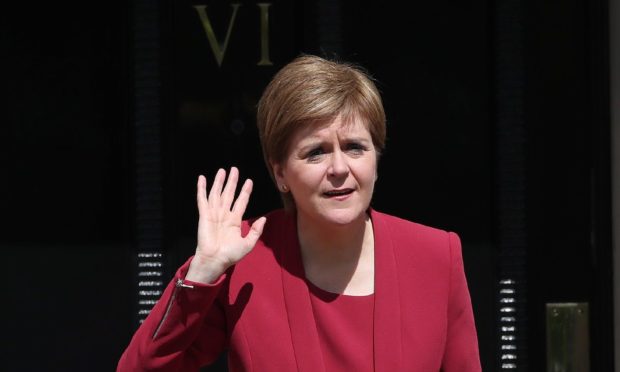First Minister Nicola Sturgeon has urged Scots to “exercise great care” ahead of this weekend’s easing of restrictions, as the ‘delta’ Covid variant drives the possible start of a third wave.
At a briefing this afternoon, Ms Sturgeon said the country was at a “critical juncture” in the fight against the virus, with the vaccine roll-out racing against a quickening spread.
She said people looking to take advantage of relaxed rules around meeting other people should be particularly careful if anyone in the group has not yet been vaccinated.
From a minute past midnight tonight, a number of local authorities across Scotland – including Moray, Angus, the Highlands, Argyll and Bute, Aberdeen and Aberdeenshire – will move down from Level 2 of Covid restrictions to Level 1.
Other places, such as Dundee, Stirling and Edinburgh, will remain in Level 2 from tomorrow due to high numbers of cases, while Glasgow will move down to Level 2 from Level 3.
In an update to the Scottish Parliament on Tuesday, Ms Sturgeon said cases numbers in several of the areas staying in Level 2 suggested that Level 3 would be more suitable, but a decision was made that such a move would not be “proportionate at this stage”.
Over the past 24 hours Scotland has recorded almost 1,000 new cases – the highest daily figure since February 17.
The ‘delta’ variant accounts for well over half of new cases in the country, and the R rate is now above one.
Pfizer news makes ‘heart sing’
The first minister led the previously unscheduled coronavirus briefing alongside national clinical director Jason Leitch.
Reacting to a question about the Pfizer/BioNTech vaccine, which has been approved by the MHRA for 12 to 15-year-olds in the UK, Ms Sturgeon said the news made her ‘heart sing’.
Professor Leitch added that it could be some time until the vaccination programme is extended to children of that age, as a number of at-risk groups still need to receive their second doses.
Vaccines have ‘substantial effect’
The success of the vaccine roll-out means case numbers as high as those seen today will not necessarily result in harsher restrictions, as the link between infection and serious illness is broken in those who have received their jabs.
However, a significant proportion of the population remains unvaccinated, and the number of people with Covid being treated in Scottish hospitals has increased from 65 at the beginning of May to 116 today.
This morning, epidemiologist Professor Neil Ferguson said most people in UK hospitals with the virus have not had a vaccine.
He told the Today Programme: “It’s important to say that most people being hospitalised at the moment with this variant, and with any Covid variant, are unvaccinated.
“So, it’s clear that the vaccines are still having a substantial effect, though it may be slightly compromised.”
